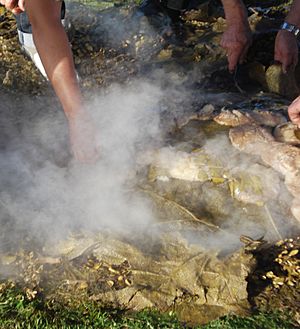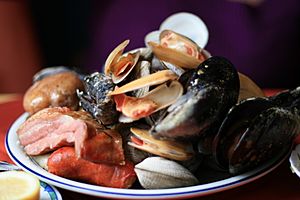Curanto facts for kids

Uncovering the curanto in Calen, commune of Dalcahue, Chiloé, Chile
|
|
| Place of origin | Chile |
|---|---|
| Region or state | Chiloé |
| Serving temperature | Hot |
| Main ingredients | Potatoes, shellfish, meat |
| Variations | Multiple |
Curanto is a special and very old meal from the Chiloé Archipelago in southern Chile. It's also popular in parts of Argentina. Imagine a giant, delicious stew cooked in the ground! Curanto is made with tasty seafood, different kinds of meat, potatoes, and vegetables. It's a unique way to cook that has been around for thousands of years.
Contents
What is Curanto?
Curanto is a traditional dish that comes from the Chiloé Archipelago in Chile. It's not just food; it's also a way of cooking that brings people together. The word "curanto" means "stone oven" in the local Mapudungun language. This name fits perfectly because the meal is cooked using hot stones in a pit dug in the ground.
How to Make Curanto
Gathering the Ingredients
To make curanto, you need lots of fresh ingredients. These usually include different kinds of shellfish, various meats, and potatoes. You might also find special potato dishes like milcao (a type of potato pancake) and chapalele (a potato dumpling). Sometimes, certain types of fish are added too. The exact amounts of each ingredient can change, but the idea is to have a little bit of everything.
Cooking in the Ground
The traditional way to cook curanto is in a hole dug in the ground. This hole is usually about one and a half meters (about five feet) deep. First, the bottom of the pit is covered with stones. A big bonfire is lit on top of these stones until they become super hot and glow red.
Once the stones are hot, the cooking begins! The ingredients are placed in layers. Each layer is covered with large leaves, often from the nalca plant (Chilean rhubarb). If nalca leaves aren't available, fig or white cabbage leaves can be used instead.
After all the food is in the pit and covered with leaves, wet sacks are placed on top. Then, dirt and chunks of grass are used to completely cover everything. This creates a giant "earth oven" or "pressure cooker" effect. The food then cooks slowly for about one hour, steaming perfectly inside the pit.
Other Ways to Cook Curanto
While the traditional ground cooking is amazing, curanto can also be made in other ways. Sometimes, it's cooked in a large stew pot over a bonfire or a grill. This version is often called "curanto en olla" (curanto in a pot) or "pulmay" in central Chile. It's a simpler way to enjoy the same delicious flavors.
The History of Curanto
Curanto is a very old dish. Scientists have found remains of curanto that are about 11,500 years old! This shows that people have been cooking in this special way for a very long time.
It's believed that the original way of cooking curanto came from the Chono people, who lived in the southern parts of Chile. Over time, as other groups of people and later the Spanish explorers arrived, new ingredients were added to the dish. This mix of old traditions and new foods helped create the curanto we know and love today. It's a living piece of history you can eat!
See also
In Spanish: Curanto para niños
 | Toni Morrison |
 | Barack Obama |
 | Martin Luther King Jr. |
 | Ralph Bunche |


